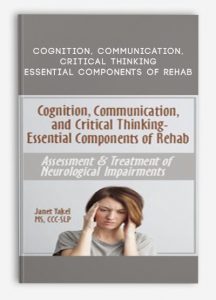 Cognition, Communication, Critical Thinking from Jane Yakel
Cognition, Communication, Critical Thinking from Jane Yakel
Archive : Cognition, Communication, Critical Thinking from Jane Yakel
Outline:
COGNITIVE COMMUNICATION DISORDERS: THE ARCHIVES OF THE BRAIN
- Developing a critical thinking approach to therapeutic intervention
- Full spectrum of neurological disorders
COMPREHENSIVE PATIENT ASSESSMENTS
- Philosophy
- Dynamic Assessments
- Person-Centered Assessment
- Model
- Procedures
- Ethics and Professionalism
ATTENTION DOMAIN: THE HEART OF IT ALL (CASE STUDY ICON)
- Attention systems and behavioral deficits
- Assessments/tests for attention deficits
- Unilateral visual neglect: Assessment and Treatment
- Treatment of attention deficits
- Case studies: Learning assessments
PROCESSING SPEED DOMAIN: THE ROOT OF INTELLIGENCE
- Assessments/tests for processing speed deficits
- Treatment for processing speed deficits
MEMORY DOMAIN: MIRRORS OF THE MIND (CASE STUDY ICON)
- Neuroscience systems of memory
- Declarative/Explicit/Conscious memory
- Non-declarative/Implicit/Unconscious memory
- Decisions for consideration for memory interventions
- Etiology: Is memory loss reversible or irreversible?
- Assessments: Screenings, Standardized, Staging, or Person-Centered?
- Approaches: Didactic, Compensatory, Functional, or Adaptive?
- Treatments
- Approaches
- Specific approaches
- Didactic
- Compensatory
- Functional-experimental
- Adaptive
- Case studies: Learning assessments
EXECUTIVE FUNCTIONS DOMAIN: THE MONITOR (CASE STUDY ICON)
- Definition, development, importance: High level cognitive abilities
- Responsibilities of executive functions/frontal lobe
- Behaviors associated with frontal lobe impairments
- Assessments/tests for executive function deficits
- Treatment of targeted executive function behaviors
- Environmental interventions and strategies
- Case studies: Learning assessment
MAXIMIZE BRAIN FUNCTION/HEALTH MANAGEMENT
- Memories: Worse enemies
- Prevention of normal memory loss
- Depression with neuropathology
Description:
The Three Essential Components of Rehabilitation
Attention, memory, and executive functions are the most commonly reported problems associated with neurological insults whether the impairment is secondary to injury, disease, or a disorder. Neurological impairments decrease one’s ability to assimilate information needed for learning; they can isolate and/or limit social interactions; and they significantly decrease one’s overall quality of life. The full spectrum of neurological impairments affects a person cognitively, physically, emotionally, socially, and functionally. Since patients are diverse in etiology, pathology, and functional abilities, understanding the processes underlying cognitive-communication impairments is absolutely crucial. Choosing relevant assessment instruments and learning to think critically when developing effective intervention techniques is paramount for successful outcomes.
In this dynamic program, rich with case studies and interactive learning, Jane Yakel, MS, CCC-SLP, reveals the essence of cognitive-communication disorders and offers a neuroscience model used to guide intervention. Relating this model to frequently used assessment measures/instruments, Jane will provide you with innovative and evidence-based approaches to therapy and intervention techniques focusing on the three key domains of cognitive communication: attention, memory, and executive function. The “neuroscience systems” models of memory will also be discussed in relation to areas of cognitive breakdown. Don’t miss this unique opportunity to enhance your practice with intervention strategies that can be applied immediately to your current caseload.
So what is NLP?
NLP stands for Neuro-Linguistic Programming. Neuro refers to your neurology;
Linguistic refers to language; programming refers to how that neural language functions.
In other words, learning NLP is like learning the language of your own mind!
NLP is the study of excellent communication–both with yourself, and with others.
It was developed by modeling excellent communicators and therapists who got results with their clients.
NLP is a set of tools and techniques, but it is so much more than that.
It is an attitude and a methodology of knowing how to achieve your goals and get results


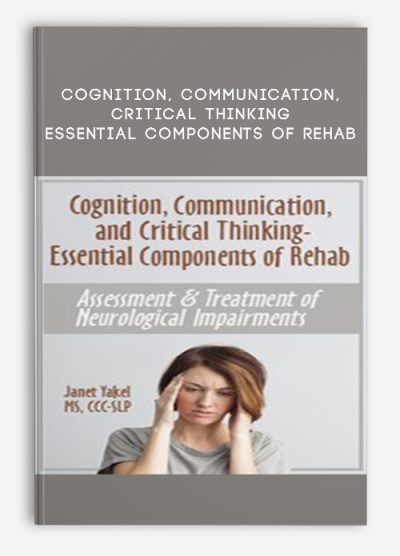


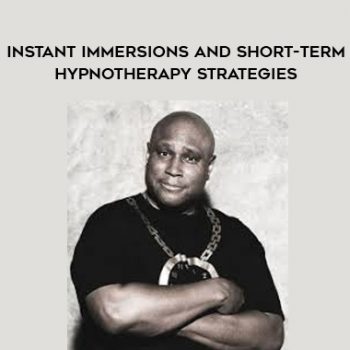

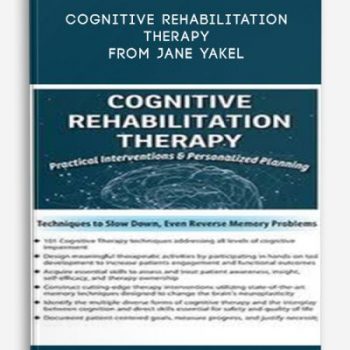



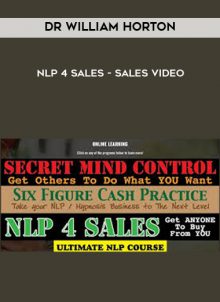

tristian –
This is Digital Download service, the course is available at Coursecui.com and Email download delivery.